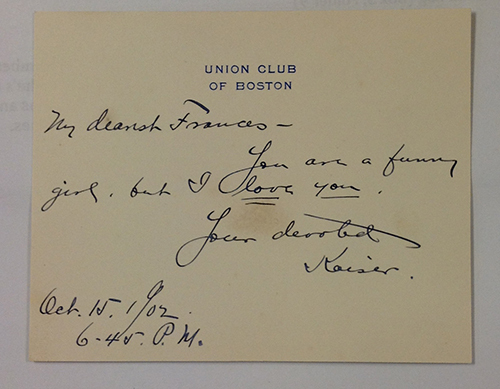A Private Life : Courtship and Marriage
One of Frances’s most passionate desires was to attend college. She passed her exams, but she abandoned her education when she married Henry Wilder Keyes (mostly known as Harry). Harry was very involved in politics, serving in the New Hampshire House of Representatives from 1891 to 1895 and from 1915 to 1917 and, at the time Harry began courting Frances, in the State Senate from 1903 to 1905. Their courtship was not always a smooth one, but it was a fairly long one. During their courtship, Harry plainly states his love for Frances in a very short letter. The letter is dated the 15th of October 1902, so it came from earlier in their courtship. Harry first started courting Frances when she was about fifteen years old. During their courtship, Louise took Frances to Europe again using the tactic of removal from the situation. Frances is also convinced that the trip was partially meant to try to break the courtship between Frances and Harry Keyes in its early stages. Louise had “issued an ultimatum,” remembered FPK in her autobiography Roses in December. (264)
Despite the time in Europe and any resistance from her mother, Frances and Harry got married in 1904, when Frances was nineteen years old. Once they were married, the couple moved to Harry’s family farm in Haverhill, New Hampshire called Pine Grove Farm. They had three children named Henry, John, and Francis (known as Peter). Like their Grandfather, (father), and Uncle James, the three boys eventually attended and graduated from Harvard University {James became and engineer and moved to Colorado} It was during this time that Harry continued to limb the political ladder. He was New Hampshire’s governor from 1917 to 1919. During this WW1 era, Frances volunteered for the Red Cross and other relief efforts. She also gave speeches for her husband and after one of the speeches, was recognized as the Lt. governor. In 1918, was elected into the U.S. Senate and then they moved to Washington D.C.


![[Untitled] [Untitled]](http://libraryexhibits.uvm.edu/omeka/files/fullsize/b504103e9dbceedac4616c7374003d5f.jpg)